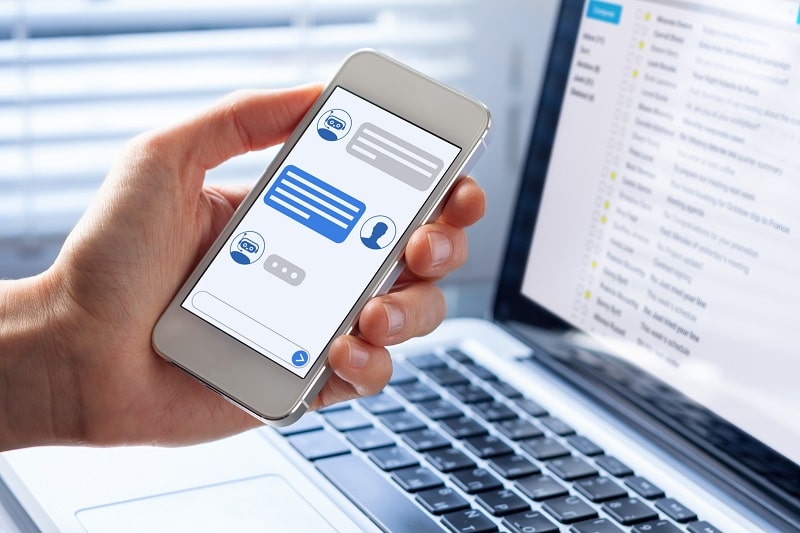This study, published and carried out by the Chatbot Observatory at the end of March, assesses how familiar Human Resources are with chatbots. Are they used in this line of work? And if yes, to what extent? Although only 23% of HR professionals plan on deploying a chatbot in their company, 68% of them believe that these new tools will become more and more widespread over the next few years.
The Chatbot Observatory was created by Do You Dream Up in October 2017. It aims to provide benchmarks for the different professions affected by the development of artificial intelligence systems, in particular chatbots, relating to their use within a professional sphere, and the prospects ahead.
HR departments are reluctant to deploy a chatbot
Although the Observatory’s first study highlighted the appeal of chatbots for marketing directors, the same cannot be said yet for HR. For HR professionals, the term “chatbot” remains obscure – only one in five HR professionals knows exactly what a chatbot is and what it can be used for, whereas one in two marketers reported that they did. 43% of HR respondents even declared that they were not at all familiar with this tool! This trend can be confirmed by Do You Dream Up’s experience as a chatbot editor – 1 in 4 chatbots are deployed to meet HR needs, versus 3 in 4 for marketing or customer service needs.
Another difference between HR and marketing is the actual, or projected, implementation of a chatbot within a company. Whereas 42% of marketers were looking into the possibility of deploying a chatbot in their company, only 23% of HR professionals were doing the same thing. Out of all the respondents, only 6% of HR professionals had implemented a chatbot at the time of the study (versus 16% of marketers questioned).
For those who had set up a chatbot, the overall experience was less successful with HR than with marketers. As such, HR directors gave an average satisfaction rating of 6.6/10 to their chatbots. That’s not bad, but it’s not a resounding success quite yet, and there is still a lot of progress to be made when defining the perimeter within which the chatbot operates and the needs it is expected to meet. Two HR respondents even gave their own chatbot 2/20!
Out of the 285 HR respondents who had not yet implemented a chatbot in their company, unfamiliarity with the subject matter was the second reason they had not done so (30 answers), following closely behind budget constraints (59 answers).
And yet, HR professionals are confident company chatbots will become more and more widespread
68% of HR professionals believe that chatbots will become more and more commonplace in their line of work. Amongst them, HR managers from medium-sized companies were the most likely to hold this favourable opinion (75%). And their marketing counterparts were even more likely to think so (92% of marketers), regardless of company size.
Below are the main functions, in order, for which HR professionals would like to implement a chatbot:
- 49% to give access to functunal HR services (e.g. leave management…)
- 34% to improve the management of training
- 26% to help employees with the internal mobility process
- 19% to intervene in the recruitment process
- 18% to inform employees about their rights
- 17% to evaluate employee performances

For HR directors, the main benefit of implementing a chatbot is to facilitate the lives of their colleagues by making HR services available 24/7. Unlike marketers, they attach particular value to the security aspect of these systems and ensure that they include login authentication functions for their colleagues. This reflects a particularly sensitive approach to the integrity of company assets, particularly staff data, a positive response in view of the upcoming General Data Protection Regulation (GDPR). Overall, HR managers have a positive image of chatbots:
68% of HR managers think that chatbots will become more widespread in human resources (versus 92% for marketers).
They think :
- chatbots will replace intranets 62%
- chatbots will handle recruitment better than a human 30%
- chatbots will be an essential tool for recruiting 44%
- chatbots are an asset for employer brand 65%
- chatbots increase the value of brand image 67%
Contrary to what could be observed amongst marketers, company size does not impact the way HR professionals views chatbots. Moreover, it should be noted that those in a Human Resources Director’s position, were the most convinced that chatbots would be useful during the recruitment process.
Chatbots and employment in HR departments: risks and opportunities
As for the relationship between job insecurity and chatbots, the survey carried out amongst HR professionals by the Do You Dream Up Observatory, yields results in line with those obtained from marketers – 60% of HR managers believe that chatbots will replace certain functions within their teams, versus 71% for the marketers. And a little over 1 in 2 HR professionals (56%) considers that chatbots will contribute to the creation of new jobs in HR departments (a view shared by 73% of marketers).
Methodology
The ‘Insititut Occurrence’ carried out this first study between the 15th and 30th March 2018 amongst 303 HR professionals located in France, in Paris, Ile de France and other regions. All company sizes and HR positions were represented, including directors (12%), managers (50%) and operational employees (38%). The margin of error is +/- 6 points (i.e. for a result of 50%, the accurate result lies somewhere between 44% and 56%).






